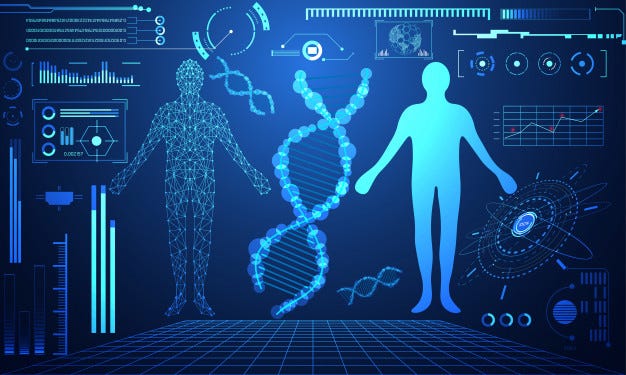(Reposted from 2019 article on Medium with 2024 Update)

What is digital health?
It can be broadly defined as using technology to help improve individuals’ (and eventually groups of individuals’) health and wellness. Technology can include, but not limited to, devices, software, hardware, databases, knowledge base, interactive forums, healthcare feedback, enabled communication, telemedicine, big data, blockchain, artificial intelligence (AI), genetic information, etc. It ranges from a complex brain electrode (for Parkinson’s disease and other brain conditions) to a steps’ tracker. This all allows for medicine that is:
-more patient-centric (including patient-partnership)
-more patient-engaged and patient-controlled
-more targeted
We often talk or hear of precision medicine as a result of all these digital health tools and ecosystems.

Digital health can be divided into two:
1) B2B/B2G or for companies and government
Typically, this includes electronic medical/health records (EMR/EHR), telemedicine, diagnostic aid for health practitioners, pharmacy and delivery
2) B2C or directly to consumer
a) Mobile health app or applications (software)
b) Mobile health hardware (including wearables and IoT — internet of things)
c) Home devices (balances, glucometer, genetic test kits or STD test kits)
They mostly do one or a combination of:
A) Tracking and storing
B) Diagnostic
C) Treatment
D) Analysis and follow up
of one or multiple health factors or conditions

How big is the digital health market?
If we combine all digital health, it is estimated by Research and Markets, Global Market Insights and Transparency Market Research to reach somewhere between $450 billion to $700 billion by 2025. CCS Insight says the wearables market alone, which is a very small part, will reach $27 billon in 2022. The growth rate by all estimates is very high and will outperform most traditional and even many innovative markets.
When we add wellness and wellbeing, we can also think of holistic health models that include preventive medicine and health. We then gradually include psychology, performance, positive thinking, meditation, awareness, relationships, happiness and well-being. This is true for the individuals, as well as organizations, who need to know their health and health risks better and be proactive in mitigating them.
As mentioned above, once individuals continue to increase their health, families, communities and eventually humankind will also benefit from all this aggregate data. Exponentially, more big data and AI analysis will allow quicker and better diagnostic based on specific individual realities and carefully compared to a thorough, wide-ranging and statistically relevant comparison to other healthy and unhealthy individuals. You may eventually then speak of predictive medicine.
Until then, let’s look forward to many technical, technological, life sciences and operational innovation, as well as a few important paradigm shifts in both individuals and groups of individuals. We can act thoughtfully locally, organizationally, as aware citizens, voters, elected parties and government or company heads in all levels of management.
2024 Update: Precision medicine, also known as personalized medicine, is an emerging approach to healthcare that tailors medical treatments, interventions, and decisions to individual patients based on their genetic profile, environment, and lifestyle. This approach aims to improve treatment efficacy and reduce adverse effects by considering each person’s unique characteristics.
Key aspects include:
- Genetic testing to identify disease risks and drug responses
- Targeted therapies for specific genetic mutations
- Pharmacogenomics to optimize drug selection and dosing4
- Use of biomarkers to monitor disease progression and treatment effectiveness5.
- Integration of big data and artificial intelligence (AI) for better diagnosis and treatment planning
- Computational science in specific medical fields like neuroscience to understand better biology, chemistry, physics and systems with models and data like fMRI
- Organ-on-a-chip technology that can use a specific person’s cell for testing treatment
Personalized medicine holds promise for improving patient outcomes, reducing healthcare costs, and advancing preventive care. However, challenges remain in implementation, data privacy, and equitable access.


